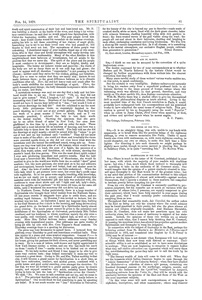 |
vol. title: Vol Four of The Theosophical Society of The Arya Samaj of Arya-wart vol. period: Sept 1878 – Sept 1879 pages in vol.: 350 |
The Theosophists in Bombay
...
<Untitled> (We beg to remind...)
...
The Power of the Will
Sir,—It is an almighty thing, this will, usable to rap heads with apparently, or to break them like the precious balms of the righteous perhaps, or even to remove mountains like Faith. Usable to mend hearts also riven with restlessness, or, with more righteous rending, to mould character, our own or others, to make this dark time a little lighter. For directing it into such channels we might perhaps be slightly more useful, though we never succeed in planting Ben Nevis in Salisbury Plain, or in quite “unveiling Isis.”
Spiritualism in the East
Sir,—There is much in the letter of M. Constant, published in your last issue, with which the majority of your readers will doubtless agree; but also, I fear, much which those inclined to theosophy will be unwilling to take on the authority of M. Constant alone. One would imagine that the opinion of a person similarly situated to himself upon theosophy in the East would be of the greatest value; but to my mind that portion of his communication devoted to this subject shows so much prejudice—I almost said animosity—against modern theosophers, that I (merely a student in these matters) feel compelled to hesitate greatly before accepting his ipse dixit.
From his own showing, M. Constant is eminently qualified to pronounce judgment, but his remarks are so much at variance with the statements of others (who, I presume, are equally competent to give their opinions), which have been fully reported in your pages during the past year, that I would certainly prefer corroboration before accepting them as true.
Throughout that remarkable work, Isis Unveiled, the author refers to the East as being not only the country where the occult sciences may be found practised in their purity, but also the place whence all science and religion originally emanated. And Madame Blavatsky, unlike M. Constant, does not make her assertions upon her own authority alone, but cites a mass of testimony in support of her statements. Indeed, the opinions of these two writers are so utterly opposed to each other, that I cannot help thinking that M. Constaut, in penning his merciless letter, has allowed his prejudice against modern Spiritualism and theosophy to warp his judgment.
In connection with the subject of theosophy in the East, perhaps the following extract from St. Martin’s Le Ministere de l’Homme-esprit (published in 1802, and translated into English by E. B. Penny in 1864) may be of interest:—
“Perhaps the time is not distant when Europeans will look eagerly at things which they now treat with distrust or contempt. Their scientific edifice is not so established as not to have some revolutions to undergo. They are now beginning to recognise in organic bodies what they call elective attraction—an expression which will carry them far, notwithstanding the pains they take not to call the truth by its right name.
“The literary wealth of Asia will come to their aid. When they see the treasures which Indian literature begins to open through the “ Asiatic Researches ” of the Calcutta Society; when they have studied the Mahabarat—a collection of sixteen epic poems, containing one hundred thousand stanzas on the mythology, religion, morals, and history of the Indians—and the Upnek’hat, translated by Anquetil, containing extracts from the Vedas, &c , they will be struck with the similarity between the opinions of the East and those of the West on the most important subjects.
“In this mine some will seek correspondences of languages in alphabets, inscriptions, and other monuments; others may discover <... continues on page 8-150 >
Editor's notes
- ↑ The Theosophists in Bombay by unknown author, Bombay Gazette, The, Tuesday, March 25, 1879
- ↑ We beg to remind... by unknown author, Indian Spectator, The, March 23, 1879
- ↑ The Power of the Will by unknown author, London Spiritualist, No. 338, February 14, 1879, p. 81
- ↑ Spiritualism in the East by unknown author, London Spiritualist, No. 338, February 14, 1879, pp. 81-2
Sources
-
London Spiritualist, No. 338, February 14, 1879, p. 81
